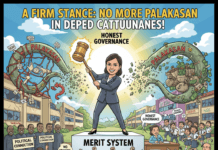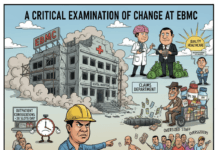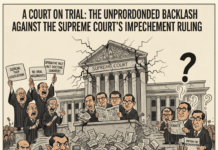By: Ferdz M. Brizo/FB-EYE
The Catholic Church in Catanduanes has reached a milestone that reflects decades of spiritual growth and community service. It all began with the late Bishop Jose Sorra, who led the diocese after Catanduanes was separated from Albay. His pioneering leadership laid the foundation for a vibrant Catholic community. This legacy was further strengthened under the guidance of Bishop Manolo Delos Santos, and more recently, by Bishop Luisito Occiano, who continues to shepherd the faithful with dedication.
Over the years, the consistent religious advocacy of these leaders allowed Catholicism to flourish throughout Catanduanes, reaching even the most remote barangays. From humble beginnings with small parish communities, the diocese has expanded into multiple parishes that have become vital centers of faith and service. This growth is a testament to the enduring commitment of both the clergy and the laypeople in spreading the faith and making a meaningful impact on every Catandunganon’s life.
A significant factor in this success has been the close collaboration between the Church and civil leaders. The symbiotic relationship between the Roman Catholic Church and the local government has proven to be a powerful force for good. Although not without challenges, this partnership has fostered an environment where the propagation of faith and the promotion of social welfare work hand in hand. It may not be a perfect relationship, but it is one that deserves to be treasured for the positive change it has brought to the province.
Looking ahead, we hope for the continued growth and service of the Church in Catanduanes. The roles of our parish priests, catechists, and various religious sectors remain crucial in nurturing faith and promoting moral values. As they face new challenges, may they continue to be guided by the principles of compassion, humility, and unwavering faith.
In celebrating these golden years of Catholicism in Catanduanes, we recognize not just the achievements of the past but the promise of a future filled with hope, service, and the steadfast commitment to living out the Gospel in our everyday lives. May the diocese continue to shine as a beacon of faith, inspiring generations to come.
***********
Sara Duterte-Carpio Shows Her True Colors
Vice President Sara Duterte-Carpio’s recent moves have laid bare the kind of leadership she represents—a brand driven by power, secrecy, and political aggression. This was most evident in the recent budget hearing where her office’s request for a staggering ₱2 billion in 2025 was met with sharp scrutiny. The proposal, particularly the allocation for confidential funds, highlights a troubling pattern of governance: one that prioritizes control over transparency. Rather than addressing public concerns, Duterte-Carpio stood firm, echoing the same dismissive tone that has marked her stance on issues of accountability.
Beyond the budget hearing, her political character was further revealed through the release of her co-authored book, Kaibigan. The book, aimed at spreading her political narrative, quickly became a lightning rod on social media, especially after it took a swipe at Senator Risa Hontiveros. Many saw it as a calculated attack—a reflection of Duterte-Carpio’s penchant for using platforms to push her agenda while targeting critics. The backlash online was swift, with netizens criticizing the book’s timing and intent, questioning whether this is the focus a Vice President should have.
This incident with Hontiveros is part of a larger pattern where Duterte-Carpio uses her influence to silence dissent rather than engage in meaningful dialogue. Her brand of politics is characterized by taking the offensive whenever challenged, whether it be against critics, opposition figures, or even ordinary citizens who dare to question her. Such behavior is not only divisive but reveals a leadership style driven by self-preservation rather than the greater good.
Her handling of public funds and her thin-skinned responses to criticism also expose the contradiction between her projected image as a strong leader and the reality of someone more focused on consolidating power. Despite the public outcry over the budget and the backlash against Kaibigan, her refusal to back down suggests a stubbornness that is more about maintaining political dominance than addressing the needs of the people.
As more of her true colors are revealed, the public must critically assess whether this is the leadership we need in these challenging times. Sara Duterte-Carpio’s approach—marked by secrecy, authoritarian tendencies, and divisive rhetoric—does not bode well for the future of a democracy that thrives on openness and public trust. What we are witnessing is a political figure who may be more concerned with building her own legacy than serving the people she was elected to represent.
*************





















